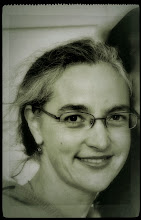"I want to go home," says Sam.
"Why?" I ask.
"I don't know. I just do," he says.
We return home, and both boys run to the backyard. The door hangs wide open behind them. With fixed gazes and hips set, they aim and throw rocks at a chosen target east of the pond. Over and over stones are hurled, then the boys run to retrieve them. I no longer watch the game protectively to interrupt if they threaten to pelt each other by mistake.
I stand quietly at the kitchen window. A bowl of blueberries sits on the table beside me with a bag of canning jars that someone mysteriously left on my step. The wind lifts tall willow branches into a dance of light, silvery leaves bending and stretching in the afternoon sun. For a moment, I choose not to think of what's for dinner, or anything else. For a moment, I only feel.
A surge of bittersweet belonging fills me. The boys are rooted here, a sense of place. This grounding feels healthy, coherent, integral. Yet, this land, too, shall pass. They will move on, with or without me. They will come home to me wherever I am, or I will bring this sense of belonging back to them when I come to visit.
Rooted. Countless generations behind me and one at the pond just ahead. The ache fills me. I have been alive lately with what I perceive as the rich reality of my relations. Colorful language, fiery forthrightness, and purposeful independence are the trademarks of my known tribe of origin. I masquerade as a post-modern hippie, but the Kool-Aid and jello that stained my cheeks as a child sitting riverside reveals my backwoods pedigree. I did not eat nutritional yeast until I turned thirty.
Part of me is becoming proud of what I once perceived as a "shadow" in my raising. My compassion stretches into celebration, a fierce devotion to the soul that pulsed in my mother and father's lineage despite poverty, alcoholism, and abuse.
My grandmother tells a story of visiting her grandmother in a hospital after her grandmother had fallen from a ladder picking cherries. The eighty-something woman had broken her neck. "What are you doing here?" she demanded of my grandmother from the hospital bed. "Those cherries are ripe! You get out there and get picking!"
I was raised on wild venison and duck meat, cheap grocery hamburger, corn from the garden, and canned green beans. Food translates to the soul of me. It is who I am. In everything my parents killed, harvested or touched I tasted the generations of hands that bore me into this world. The cans from the food bank, sheepishly accepted, tasted like wounded pride, and that, too, shaped me.
"Where did you get your faith in God?" Seda asked me through the kitchen window last night.
"Adversity, I guess. Funny thing to ask through the window," I said.
There are parts of my roots that the children barely recognize. Parts of Seda's roots as well. Where once I wished to hide what unfurls deep beneath me, I now seek to share openly but gently. Roots are, in their right, sacred. They can be damaged.
The understory is alive in me. Nothing to outrun, outrace, or cast off. It is my path into light.
There, my boys throw rocks under the sun. In our protected wilds, a small city yard consumes them. They belong.
And so do I with them.
